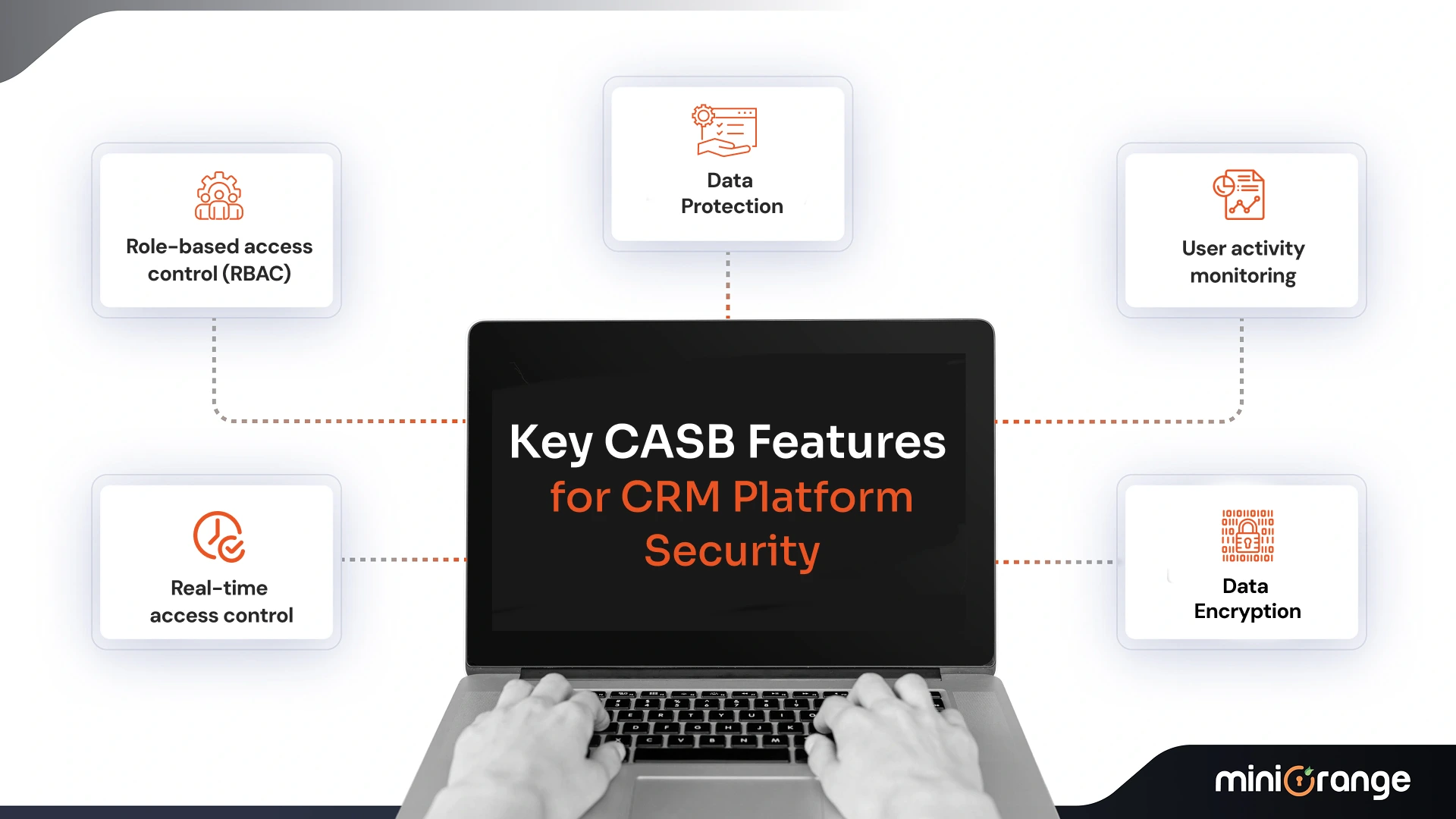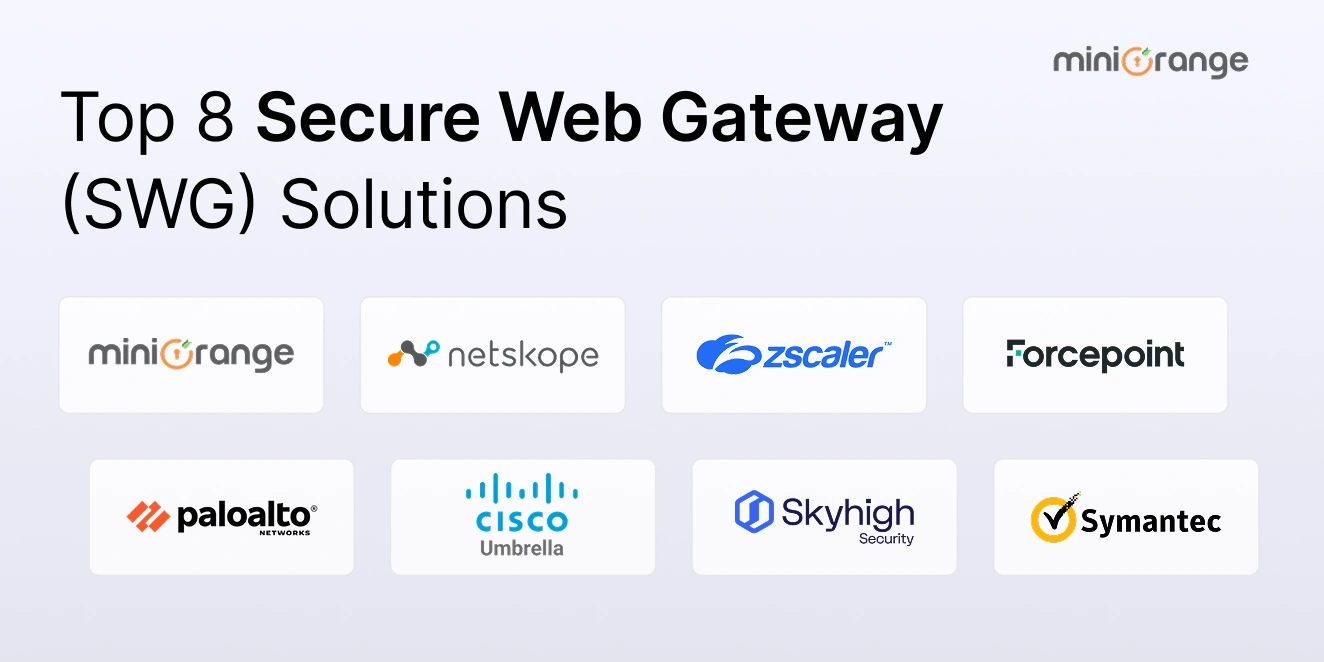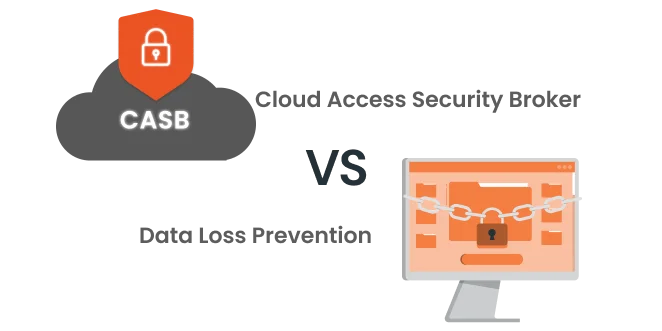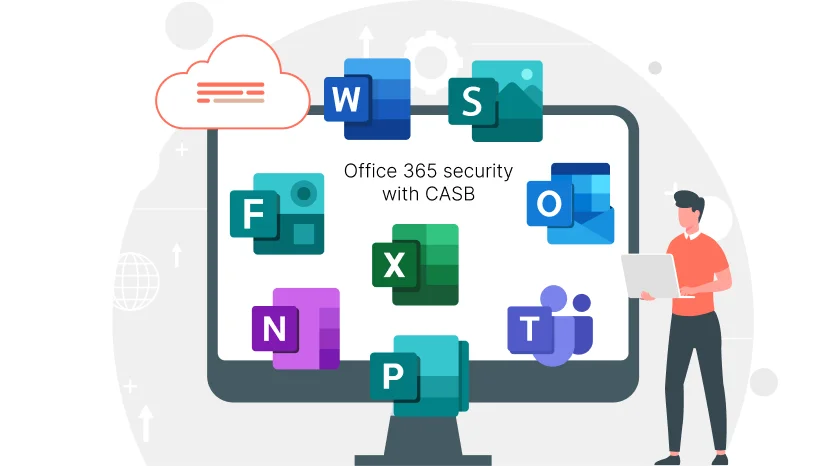Why is a CASB Solution Crucial for CRM Platforms?
CRMs like Salesforce, HubSpot, Freshworks, and Zoho manage sensitive customer data across sales, marketing, and support. As teams access these platforms remotely and connect them to third-party tools, the risk of data exposure grows. Most CRMs weren’t built to handle this level of complexity on their own, which is why CRM security with CASB has become essential.
A Cloud Access Security Broker (CASB) adds the missing layer of control. It monitors user activity, flags risky behavior, and enforces real-time CRM data protection with CASB. Instead of relying on trust, CASB gives you real visibility and control over how data moves within and beyond your CRM, ensuring secure CRM access with CASB to maintain compliance and security.
Let’s understand how the 4 Pillars of CASB work for CRMs in real-world scenarios.
The Four Pillars of CASB for CRM Applications
A strong CASB solution has four principles: Visibility, Compliance, Data Security, and Threat Mitigation. These pillars work together to help organizations secure how users interact with cloud CRM platforms and how customer data is handled. Without them, blind spots can form quickly, especially in large, distributed teams working across multiple regions and systems. CRM security with CASB is key to ensuring that every action within the CRM is visible and controlled, reducing the risks of unauthorized access.
Here’s how each pillar plays out in a CRM environment:
- Visibility
Track user activity across your CRM to identify unusual access patterns. For example, if a sales rep suddenly exports a large customer list at 2 a.m., the CASB solution will alert the SOC team of the suspicious behavior. With secure CRM access with CASB, you can be sure that only authorized users are accessing sensitive data, at the right time and from the right locations.
- Compliance
Apply policies that align CRM data usage with regulations like GDPR, HIPAA, SAMA, DORA, ITAR, and more. A CASB can flag when a support agent uploads sensitive client records to unauthorized locations like personal cloud drives. By using CRM data protection with CASB, businesses ensure that all data handling meets compliance standards, reducing the risk of regulatory violations, and achieving CRM compliance with CASB.
- Data Security
Enforce access controls, apply encryption, and prevent unauthorized data sharing. If someone tries to email confidential deal information directly from the CRM, the CASB can block it instantly. By utilizing CRM security with CASB, businesses can prevent data leaks and ensure that only those who should access information can do so.
- Threat Protection
Detect account takeovers and insider threats using behavior analytics. If a user logs in from two countries within an hour or starts accessing records they normally wouldn’t touch, the CASB intervenes. This real-time protection ensures secure CRM access with CASB, keeping the organization’s data safe from malicious actors and unintentional misuse. These pillars define the core value of a CASB. Next, we’ll explore the specific features that enable these capabilities within CRM platforms.
Key CASB Features for CRM Platform Security
Cloud CRM platforms require more than basic security settings to stay protected. A Cloud Access Security Broker (CASB) provides the tools that help organizations manage access, secure data, and meet compliance requirements across complex environments. CRM security with CASB is essential for ensuring that data remains protected as teams interact with CRM platforms in diverse and distributed environments.

Here are the core features that enable strong CRM security with a CASB solution:
- Data Protection: Enable data security policies to prevent sensitive information exposure and block unauthorized data sharing or downloading. If a user attempts to export customer data to an unapproved location, the CASB can stop the action instantly. With CRM data protection with CASB, businesses gain control over who can access and share CRM data, ensuring that sensitive customer information is never at risk.
- Role-based access control (RBAC): Define what each user can see or do based on their role within the organization. For example, a sales associate can view their accounts but cannot access financial records or admin settings. This feature ensures secure CRM access with CASB, as it enforces specific access rights based on each user’s responsibilities, reducing the risk of unauthorized access to sensitive data.
- Real-time access control: Apply dynamic restrictions based on network IP, device type, login time, and geographic location. If someone tries to log in from an unknown country or during non-working hours, the CASB can require step-up authentication or deny access. With CRM security with CASB, organizations gain real-time control over user access, ensuring that only authorized individuals can interact with CRM data under approved conditions.
- User activity monitoring: Track behavior inside the CRM to detect unusual patterns such as excessive data exports, repeated login failures, or access to restricted records. By monitoring these activities, CASB helps detect potential security threats early. This feature supports CRM data protection with CASB by ensuring that users do not engage in activities that could jeopardize the integrity of the data.
- Data encryption: Secure sensitive information at rest and in transit. This ensures that even if data is intercepted or exposed, it cannot be read or misused. With secure CRM access with CASB, businesses can confidently store and share sensitive customer data, knowing it remains encrypted and protected from unauthorized access.
These features work together to provide full-spectrum protection for your CRM. In the next section, we will break down the broader business benefits of using CASB for CRM platforms.
Benefits of CASB for CRM Platforms
Implementing a CASB in your CRM ecosystem provides more than just technical protection. It delivers strategic advantages across security, compliance, and operational efficiency. With CRM security with CASB, organizations can ensure that sensitive customer data remains protected, regardless of the complexity or scale of their CRM environment.
1) Improved Data Visibility: Gain a centralized view of user activity, data access patterns, and file movements across your CRMs. This supports better decision-making and faster threat response. CRM data protection with CASB ensures that you can track exactly how data is accessed and shared, preventing unauthorized behavior before it becomes a problem.
2) Reduced risk of Data Breaches: Identify and block risky actions in real-time, such as unauthorized data exports or access from unapproved locations. Secure CRM access with CASB gives you the control to quickly respond to these threats, ensuring that only authorized users can interact with sensitive CRM data.
3) Stronger Compliance Posture: Automate enforcement of regulatory policies for standards like GDPR, HIPAA, ITAR, DORA, SAMA, and PCI-DSS. Maintain clear audit trails for internal and external reviews. By leveraging CRM security with CASB, businesses can confidently meet regulatory requirements without the need for manual monitoring and intervention.
4) Consistent Policy Enforcement: Apply the same security and access rules across users, devices, and locations to reduce the risk of policy gaps or exceptions. With CRM data protection with CASB, you ensure that the same level of security applies regardless of where or how your employees access the CRM.
5) Operational Efficiency: Empower security teams with automated alerts, pre-configured controls, and reduced reliance on manual reviews. This drives efficiency while maintaining the level of oversight needed for secure CRM access with CASB.
6) Secure Remote Access: Allow employees and partners to work from anywhere without compromising CRM data security. Secure CRM access with CASB ensures that remote access to CRM data remains protected, regardless of the device or network being used.
7) Faster Incident Response: Investigate access events and potential threats using detailed logs and behavioral analytics. With CRM data protection with CASB, security teams can respond quickly to incidents, reducing the window of exposure.
These outcomes position CASB as a critical layer for CRM security strategies. Next, we’ll look at the deployment models available and how they fit different business environments.
CASB Deployment Models for CRM Platforms
Choosing the right CASB deployment model is essential to ensure seamless integration with your CRM platform. Your chosen model affects scalability, visibility, and how quickly you can enforce security policies across your users and data. Here are the primary deployment models and how they apply to CRM environments:
API-based deployment
Connects directly to the CRM platform using native APIs. This model offers deep visibility into user activity, file sharing, and data access without interrupting workflows. It's ideal for platforms like Salesforce or HubSpot, where out-of-the-box API integration is supported.
Proxy-based deployment
Routes traffic between users and the CRM through a proxy, allowing for inline policy enforcement. This model provides real-time control but may require more setup and can impact user experience if not configured properly.
Agent-based deployment
Installs lightweight agents on user devices to monitor and control CRM access. This is useful in highly regulated environments where organizations need strict endpoint control, especially for remote or hybrid teams.
Out-of-band deployment
Operates independently of user traffic and applies policies directly with the CRM provider. It’s often used to scan data at rest, detect policy violations, or audit historical activity without affecting performance.
Each model has its strengths, and many organizations use a combination to cover different use cases. The right approach depends on your CRM platform, user base, and regulatory requirements. In the next section, we’ll walk through how to plan and implement CASB for CRM environment effectively.
How CASB Prevents a Costly Data Leak for Businesses?
How miniOrange CASB Secures CRM Data in a Real Business Environment
Let’s look at how the miniOrange CASB solution works in a real-world business scenario to secure CRM platforms. Imagine two users inside a global consulting firm. Roger is a CRM administrator who manages client data inside Salesforce. George is a third-party marketing consultant brought in to support a regional campaign. He needs temporary access to the CRM records to analyze customer engagement and prepare reports.
With miniOrange CASB in place, the company applies strict access controls to protect sensitive client information. George connects to the CRM through a secure, approved channel. He can view only the data relevant to his role, and he cannot download or copy any information to his local device.
If miniOrange CASB detects any suspicious activity, such as George attempting to export data, accessing information outside his permission level, or logging in from an unrecognized location, it immediately blocks his access. Roger receives an alert and reviews the situation before deciding whether to restore access or escalate the issue.
This is how miniOrange CASB safeguards CRM platforms. It ensures that data remains secure, that only the right people have access, and that every action is monitored and controlled without disrupting productivity.
Summary
CRM platforms hold some of the most sensitive and business-critical data within an organization. As cloud adoption grows and remote work becomes standard, securing these systems requires more than basic access controls. A Cloud Access Security Broker provides the visibility, control, and real-time enforcement needed to keep customer data safe and operations compliant.
By implementing CASB, businesses can prevent data leaks, ensure regulatory compliance, secure third-party access, and gain deep insights into how users interact with their CRM platforms. Whether you're using Salesforce, Freshworks, HubSpot, Zoho, or Microsoft Dynamics, CASB strengthens your security posture without disrupting the way your teams work.
miniOrange offers a powerful CASB solution built to protect CRM environments. With advanced policy enforcement, real-time monitoring, and seamless integration, it helps you take control of your data and secure your CRM from the inside out.






Leave a Comment